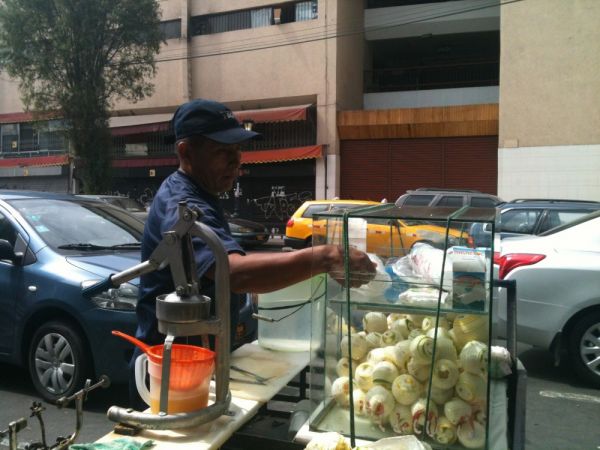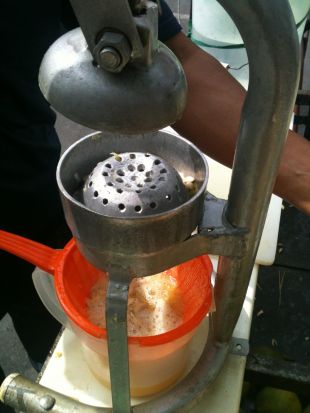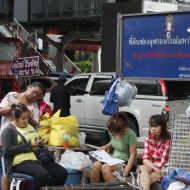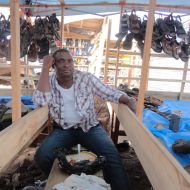Putting His Kids Through College, One Orange at a Time

Mr. German squeezes oranges on a fairly quiet corner in Lima.
It’s Sunday morning in downtown Lima, and streets that are usually crammed with people during the hustle and bustle of the weekday are down to just a trickle of foot traffic. Nevertheless, a middle-aged man has temporarily parked his bicycle cart outside a shopping center and set up his mobile orange-juice stand, his dark eyes peering from beneath a blue hat faded from long days of standing in the sun.
He gives his name as Mr. German (pronounced Her-man) and tells me he’s been at it since early that morning – 4:30 a.m., to be precise, at which point he was up and off to get his cart stocked with oranges from a wholesale market not far from his home. “I start selling my juice at five in the morning and I end at four in the afternoon, [when] I go home and rest,” he says.
Mr. German’s story is not unlike that of many street vendors in the city. An older man, he sells what he can where he can to support his family. He says he doesn’t like to talk about the past, and offers very little about how he got his start on the streets of downtown Lima, other than to tell me he had a small business that went bankrupt in the early 2000s, and that he and his wife used the little money they had left to buy a couple of bike carts and the equipment needed to make orange juice.
Ever since then, he’s pieced together a living a few cents at a time, making up for his low prices with high-volume sales of an in-demand product. Even on a slow Sunday morning German gets quite a few customers; as we talk he makes a sale about every two minutes. He sells his juice for 1 sol ($0.37) per small cup and says he can easily sell over 100 cups on a weekday. Ever the salesman, he schools me on the benefits of drinking orange juice every day. “People like to drink this in the winter, it has vitamin C and it’s good for colds and coughs, all those things,” he says.

When he lost is job, he used his savings to buy the cart that now provides his income.
He is one of hundreds of informal vendors that roam the streets of downtown Lima, and who routinely make the news every time the municipality tries to evict them from the area. These evictions have been going on for decades; ten years ago, when the city’s economy was moribund, impoverished vendors hawked their wares from shuttered factories and the foundations of high-rises that were never built. Today, Lima’s economy is roaring back, but the vendors are still here and the evictions continue. Last year, a mass eviction of vendors at La Parada market ended in bloodshed.
“I’m an informal worker, I don’t have a permit, so I just sell my product as I go about,” German says. Although he isn’t shy about discussing his informal status, he tells me he often has to watch over his shoulder for city officials looking to drive him away or seize his supplies.
“The municipality takes our stuff, they take it all,” he says, adding that he sometimes feels he gets treated more poorly than a comon thief. “The thief steals at ease, but us vendors get chased worse than them.”
Still, German says he isn’t deterred by the occasional seizing of his goods. “I’m not afraid. Why should I be?” he asks, adding that as long as he has his cart he can quickly resupply within a day.
He’s been selling juice from his rust-colored cart for the past six years. As we talk, he deftly skins his oranges with a small knife, leaving behind spiral-shaped peels, which he neatly piles on top of each other. “I have a machine for peeling, but I can do it better and get more skin off with my hands,” he says. The peeled oranges then get sliced in two, and each half is pressed against a chrome juicer with a plastic canister below it.
“When you don’t have a job you need to look for how to make money, because my children are studying and it costs money. All three of them are studying in college, and everything costs. It’s the way of overcoming this,” he says, gesturing to the streets around him.
Even with all the hurdles he feels the city throws his way, German has no plans to stop working. “Maybe until my children are professionals and then I can get some rest,” he says. “The streets get tiring.”
All photos by Manuel Vigo









